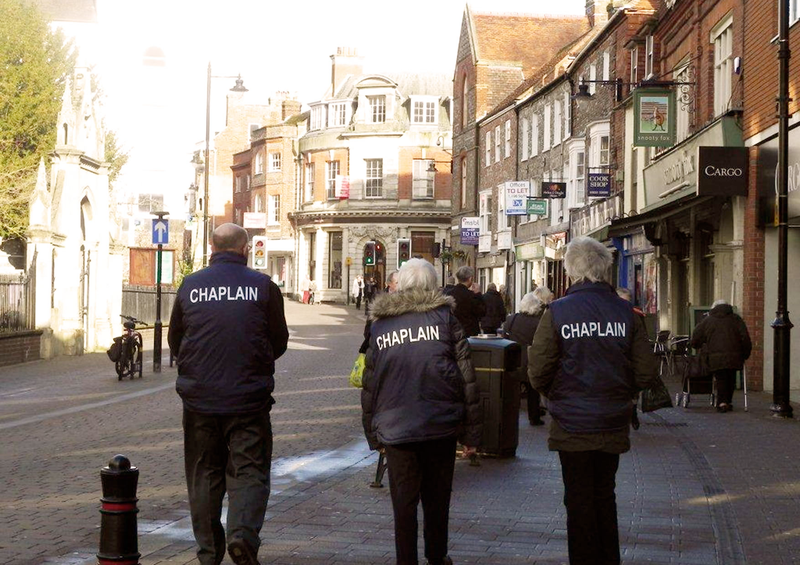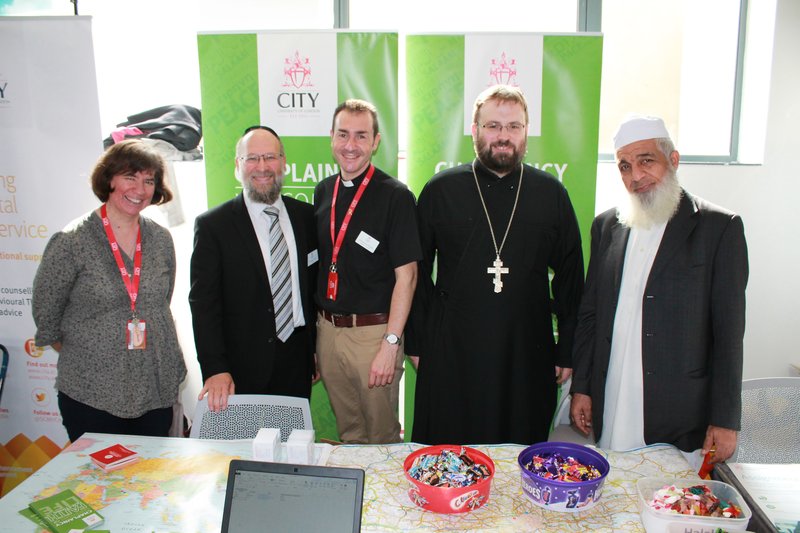 Chaplains are people appointed by the Church to work in all kinds of places outside the normal life of the congregation. There are chaplains in hospitals, workplaces, prisons, the armed forces, shopping centres, rural areas, colleges, universities and schools to name but a few. In all these places chaplains try to show God's love through offering care and support, and by representing Christian values and beliefs. Chaplains share the great privilege of discovering what God is doing out there - beyond the Church. In our diverse society, chaplaincy has to show the greatest sensitivity and respect. Christian chaplains often work in ecumenical teams or alongside colleagues from other faiths.
Chaplains are people appointed by the Church to work in all kinds of places outside the normal life of the congregation. There are chaplains in hospitals, workplaces, prisons, the armed forces, shopping centres, rural areas, colleges, universities and schools to name but a few. In all these places chaplains try to show God's love through offering care and support, and by representing Christian values and beliefs. Chaplains share the great privilege of discovering what God is doing out there - beyond the Church. In our diverse society, chaplaincy has to show the greatest sensitivity and respect. Christian chaplains often work in ecumenical teams or alongside colleagues from other faiths.
The Methodist Church has a long history of chaplaincy work going back to the time of the Wesleys and you will find Methodist Chaplains in some quite surprising places. Chaplaincy schemes may be supported and run by the local Church, the Circuit, the District or the Connexion, but there is always some sense in which the chaplain is “sent” by the Church. Chaplains always work with the support of the Church – they are never alone.
There are many different kinds of Methodist chaplains. Most are volunteers - ordained ministers working full time as chaplains are very much in the minority. A Chaplain could be a visitor at the hospital, part of a team who talk to the staff in the shopping centre or someone who meets with students and staff at the local College.
 Chaplaincy is...
Chaplaincy is...
an ancient tradition
St Martin of Tours ( 316-397ad) was a Roman Army officer who encountered a destitute man near the gates of Amiens and cut his army cloak (capella) in half and became known as the first capellainor chaplain. After ordination, he was commissioned to work away from the main church building in places where people were in special need. Buildings created for this special work were known as chapels!
So from the beginning chaplains have had a particular pastoral and practical care for people in critical need.
They work where people are not waiting for others to come to them and they are ready to make themselves vulnerable having only half a cloak left. Martin incidentally, began his ministry as a lay person.
part of the ministry of Jesus
The Gospels have only a few references to Jesus being in the Temple and one of him in a synagogue at Nazareth. Apart from these, the ministry of Jesus is conducted largely outside the confines of the gathered community of faith. This is a context that chaplains recognise as they follow their call to discipleship, living out the gospel in word and deed, making real the ministry of Jesus in our time and place.
in the tradition of John Wesley
Our origins and self-understanding as a Church are essentially missional. Chaplains (amongst others) essentially have a 'sent' status - conferred by the Church - representative of the Church and the whole Christian cause. Chaplains may have a prophetic role to speak a word of caution and to encourage reform - creating the kingdom of God
 living and working in a plural world
living and working in a plural world
Most chaplains now work in a multi-faith environment. This is not an option, it is a necessity and it can also be a blessing.
Most chaplaincy also engages with people who do not know the Christian story or have any structured spiritual understanding. They might be very cautious of using religious thought-forms or language. So chaplains need a special facility for such engagement.
 What do chaplains say?
What do chaplains say?
- So what do I do? Well it’s less a matter of ‘doing’ and more a matter of ‘being’. Just being there in the ups and downs of life. (Prison Chaplain)
- At a time when fewer people have any kind of meaningful contact with a church it’s a wonderful opportunity to affirm the presence of God in the world and his concern for every aspect of human life. (Retail Chaplain)
- The work continues to ensure on behalf of the Church, that all young people know that Christians do care about them and certainly God does. (Youth Custody Centre Chaplain)
- I joined them on a day’s training. They placed me in a full size 747 and set fire to it!... ‘Come and see’ is the invitation by Christ (John 1) to go beyond the walls and discover new life. (Airport Chaplain)
- I gradually began to form relationships. It took time to break down the suspicion of paramedics who had not had much experience of chaplains. (Ambulance Service Chaplain)
- There are tears, there is empathy, there is togetherness across religious divides, there is God. (Prison Chaplain)
- Being an army chaplain is a great privilege, to talk to young soldiers, who will tell you things that they would not normally talk to a minister about. (Army Chaplain)
- Pairs of chaplains walk round the market and Shopping Centre every Thursday, offering a smile and encouragement. Retailers are now starting to trust and share in conversations with us. (Town Centre Chaplain)
- For us, it is a privilege to ‘be there’ and alongside others in their need and openness to God. (University Chaplain)
- Chaplaincy is not so much taking God to the front line, but rather disclosing his presence in the toughness of life and living. (Police Chaplain)
All of this says that chaplaincy is a way for us to involve ourselves in God's mission to the whole of society and this is a huge opportunity.
Chaplaincy is also a slightly hidden ministry. Most people are amazed to find out that there are several hundred chaplains in the Methodist Church. The following areas of chaplaincy have been traditionally recognised, or have recently emerged, within Methodism: armed forces, schools, further education, higher education, healthcare, prisons, rural and agricultural, workplace, emergency services, transport, tourism and the tourist industry, town centre, elderly care, sports, young people, temporary (festivals, conferences, etc)